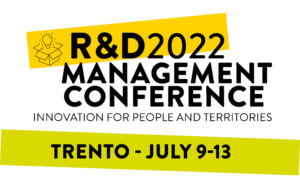R&D Today conducts an interview with Suchit Ahuja, Rajnish Tiwari and
Stephanie Cadeddu in the run-up to the R&D Management Conference 2022.
Center for Frugal Innovation is also this year involved in the organization of a track at this year’s R&D Management conference (July 11-13, 2022) in Trento in Italy.
Track 2.15 with the title “Frugal Digital Innovation & Transformation: Impacting Business, Society, and the Environment”is being organized by Track Chairs: Suchit Ahuja (Concordia University, Montreal, Canada), Rajnish Tiwari (Hochschule Fresenius/Center for Frugal Innovation, Hamburg University of Technology, Germany), and Stephanie Cadeddu (Cégep du Vieux Montréal, Canada).
R&D Today, which is a publication outlet of the Research and Development Management Association (RADMA) spoke with the Chairs of this track. In their own words:
The need to reuse and repurpose during a time of restricted resources has created a wider resonance for a frugal approach. Arguably, frugal digital innovation provides an opportunity to drive attainment of UN’s global sustainable development goals (SDGs) in a scalable and impactful manner. However there are detractors, with criticism that ‘frugal’ is another consumption-driven paradigm of innovation. We asked the three co-chairs of the track at the 2022 R&D Management Conference – Suchit Ahuja, Rajnish Tiwari and Stephanie Cadeddu – how they see the field of frugal innovation developing.
Here some of our summarized answers:
The recent global crises have made the theme of frugal innovation even more relevant, and with our tack we are hoping to raise awareness regarding the strengthened rigour of frugal innovation research and practice. Frugal innovation and frugality have already been embraced as parts of emergent solutions to several ongoing grand challenges and we would like to see it intersect with other concepts so that there is mutual growth of research, and other disciplines benefit from the literature. For example, there is now research in responsible health innovation where frugality is one of the foundational pillars that leads to positive change in health systems.
We expect the track to advance the theoretical utilisation of frugal innovation by other disciplines and conceptual literature. We also aim to bring attention to how digitalisation and novel technologies are fuelling the development of new frugal solutions and how their diffusion via global ecosystems is creating significant economic, environmental, and social impacts.
For full interview, see: https://www.rndtoday.co.uk/latest-news/frugal-digital-innovation-and-transformation/

